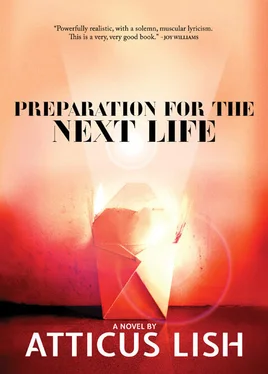You got any water?
Then green lights streamed up out of the earth. They spewed up, streams of them, incandescent. The sound hit — roaring screaming earsplitting. In the arc-weld light, solid forms appeared to shift — the hanging dust. Shadows were running. The drilling deafening thundering never stopped. The razor lights leapt straight across the black, flashed past — he whipped his head around — and they went away and went arcing slowly down like baseballs. The ground and the air were being shocked. He forgot what he was lying on, whether it was the roof or the ground. The reverberating detonating went on. In the pockets of the sound, there was deafness and blindness in the sudden total black. Everything that was not massive was obliterated. The shock-shock thudding got louder and louder like an exercise to destroy the hearing. The green stars were streaming back this way like a garden hose. He felt them in the ground. Hypnotic and kinetic. The zipping energy and acoustic snapping getting nearer.
Then the spot where Sconyers’ voice had been exploded and they were buried in sand.
He scrambled to the floor. When he came to, he was trying to hold his body together and his heart was revving. The McDonald’s made no sense to him at first. He was hyperventilating and attempting to dig into the tile floor with his hands.
His heart kept slamming as if he had been injected with atropine.
When his friend exploded, something had struck Skinner in the back. After the pieces stopped raining down, he scrambled to his friend, he felt him in the sand, and tried to pull him up. Skinner couldn’t lift him. Instead his weight had pulled him down with all their armor. The sand was filling up with Sconyers’ blood. He was letting him die. He was trying to lift Sconyers, and Sconyers tried to help. The sand became a sucking, sloshing pit that soaked them both and overflowed with blood. It soaked his trousers, his PT shorts, his legs, and socks, which squished. The blood wet his hands and arms, it got on his weapon, and got in his face and mouth and eyes, and he tasted it, his friend’s blood. And the blood itself had weight and the sand had weight, and they combined as a blood mud that dragged them down.
Then the others helped him, and Jake’s body came up, and they ran with him swinging between their arms. They put him on a poncho. Skinner had to be ordered to pull himself together. He was sent back stumbling over the thundering wasteland, barely able to run, to get the rest of his body, and ran ducking and stumbling, wheezing with exhaustion, at a loss to find where they had been. And he collapsed because his body finally realized that he had been wounded too. Graziano ripped out plastic from his butt pack and stuffed it over the hole in his chest cavity.
He stopped.
There was no one here — he huddled frozen rigid, waiting for things to fall into place. Limb by limb, he unclenched himself, dropped his head back against the plastic seat, let out his breath, sat there on the floor blinded by the white fresh sunshine. It was bright and still among the clean, modular tables. A regular, soft, sweeping sound coming in through the thick sealed glass.
Could be a dayroom in an army hospital.
The sound outside was cars going by, in America.
He made the decision to put on his filthy sock, the one that had fallen off. Then his boots. He wadded up his poncholiner and stuffed it away again with his shaking hands, which were going to fly away on him. He used the restroom faucet and took a pill.
After a minute, he picked his gear up and, balancing the weight, climbed downstairs. There was a sea of people surging in the doors and he pushed his way out through them.
He dropped his bags on the sidewalk, stood and smoked a cigarette in the cold sun.
Skinner and Jake had been evacuated and saved. They were alive when they made it back inside the wire. Both of them had heartbeats in the sandbagged field hospital in the battalion camp out in the desert. Skinner in unbearable pain, the convoy delayed for tactical reasons, gunfire pop-pop-pop thudding in the street, a calm voice speaking on the radio as searing hot shell casings spewed on them, the gunner yelling, everyone in panic, Skinner screaming and groaning — the driver shouting that they had to back up and try a different route because they were taking too much fire. Other soldiers were killed outright. They heard death on the radio. They were all going to die. Then they made it to the battalion, and their bodies were dying. Jake, a half body, was thrown on a dripping canvas cot in the green field hospital, generators running, his genitals exposed between the meat cross-sections where his thighs had been, his flesh being worked over by a spinning brush while a jet of water sprayed at the wound to clean it. The army sent them back to a giant military hospital on the east coast. Jake was kept alive in Walter Reed.
Six weeks later, Skinner joined a rehab platoon in Georgia and stood formation with guys in wheelchairs. He raked sand in the volleyball court and took painkillers for the headaches and shuffled through the chow hall putting gravy on his meatloaf, watching the war on TV. The summer days were dark and storming and the trees blew down on base.
A doctor, a Coloradoan who looked like the captain of a college wrestling team, told him he was better. You’re four out of five. Your unit will be glad to have you back. Good news, right? He called Skinner hard charger. Now you can go strap on an M4, hard charger. He had brown hair, a muscular athletic physique, sunken cheeks, and the insincere niceness of a frat boy. He tossed the file onto the desk in the consultation room, called Next! and Skinner shuffled out.
No one told him the results of his cranial scan. He had unbearable headaches and double vision. The army gave him reading glasses. There was no mention of PTSD or TBI. When he got back to the war, he was considered a discipline problem. In the cold season, in the blue desert night when the steppe winds came down from Kurdistan and his squad was sleeping bundled in the hangar after an 18-hour patrol, he squatted alone outside smoking a cigarette butt and staring at something-nothing beyond the wire. His speech was affected. He did not know how to diagnose himself. He was disciplined for having a round in the chamber of his weapon when weapons were supposed to be clear. They caught him walking around with his safety off. He was ordered to perform remedial calisthenics in NBC gear and a gas mask.
On leave, he went to see his family and got physically violent with his little brother. His mother threw him out. He went back to base and thought things will be better when he got out of the military. He apologized to his brother and his brother forgave him even if his mother didn’t. The army let him believe he was eligible for the Warrior Transition Program, and he was already planning to buy a car and go visit Jake, when they stop-lossed him. It was fairly devastating news. His mother cried on the phone and said she was sorry.
The battalion was handing out antidepressants like free candy on your way to the PX to get the magazines and iPods and protein powder and energy drinks you were taking with you back to war.
Back in Iraq, he deteriorated as a soldier. He was in a new AO, hard by the Euphrates, and car bombs went off at mosque time. The civil war had started. He could not function. He fell asleep on watch. A rugby playing sergeant known for being hard smoked him in MOP gear in the noon heat, called him a shitbag, a bottom feeder, a retard, etcetera.
Skinner drank five canteens of water and the water kept running out of him, his eyes unfocused, the sun blazing off his sweat, the rubber suit lying on the sand at his feet like the empty shell of himself, a human skin.
Everyone in the war had changed, the war had changed, and Skinner’s strangeness barely showed. It was chalked up to the war, as if it were logical. The war itself was always ever stranger. Within his unit, he became identified with a group of soldiers called the Shitbag Crew. A shitbag was a wag bag, which they called a wookie bag. They said Wookies, Yo, when they bumped fists, and it was like saying we’re staying alive. They had superstitions, rituals, which became ever more involved. A tribal life began. Some of the gangs within the infantry were involved in murder. They dropped wire or weapons on corpses. A gunny from Akron, Ohio, was the capo of a death squad.
Читать дальше












